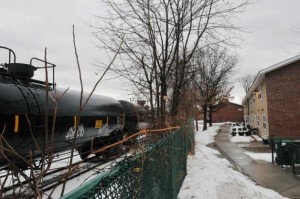Poverty, profiling, and pollution: A tale of two cities

Throughout the United States, with the Capital Region being no exception, urban areas suffer from poverty, crime, subpar housing and low economic development. Residents in the lowest income sections of local cities live in an environment that is far less hospitable than the affluent neighborhoods outside of the cities that many enjoy.
Currently there are two issues gaining traction locally that highlight some of the difficulties for those living in such situations.
In Troy, following an incident at a nightclub in late January, citizens are bringing to light a pattern of police misconduct in the city.
In Albany, some citizens are concerned about the expansion of oil being transported through the Port of Albany. The explosive crude oil is shipped within a few hundred feet from residents in the south end of Albany. Last year a train exploded in Canada killing 47 people.
These are examples of extraordinary stress in local cities. People shouldn’t have to worry about police abuse when walking down the street and they shouldn’t have to worry about oil explosions or pollution in their backyard.
In both cases, activists are fighting to have their voices heard and challenge the continuation of these problems. Federal authorities are also becoming involved with both issues. The Department of Justice is reviewing the Troy Police Department and Congressman Paul Tonko has written to the Department of Environmental Conservation about the safety of oil shipping.
Another common denominator between the two issues is that African American communities are on the front lines. In Troy, race is clearly a factor when it comes to the grievances against the police. In Albany, the neighborhood closest to the train tracks and port has primarily African American residents.
Throughout February, Hudson Valley held multiple lectures, movie showings and exhibits for Black History month. A clear theme throughout them was an ongoing inequality between black and white Americans. When looking at wealth, income, unemployment, graduation rates and incarceration rates, there is a startling gap.
Corey Ellis delivered a lecture at Hudson Valley in February. He is a former councilman in Albany and currently works as the cofounder and vice president of the Capital District Black Chamber of Commerce.
In an interview the week after his lecture, Ellis explained how, when creating the organization, leaders at the national level were surprised at the state of black owned businesses in the area.
“They said to me, you don’t even have a black owned gas station?” said Ellis.
The Capital Region Black Chamber of Commerce is working to make loans accessible in some of the primarily African American neighborhoods with high poverty rates. Access to credit is key for starting businesses and economic development.
Communities that suffer because of adverse conditions have an impact on all citizens. Living in one of the “nicer” neighborhoods in Troy doesn’t make the possibility that the police are abusing their power any less concerning. Those living farther from the port in Albany could still face devastating effects from a disaster.
“If the least of us are not making it, then we’re all not making it,” said Ellis.
